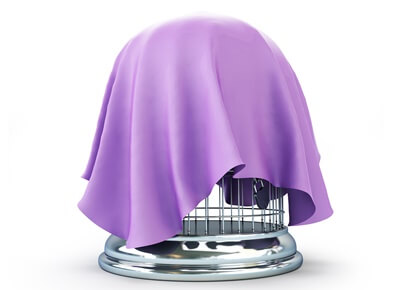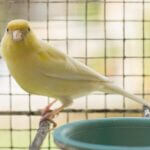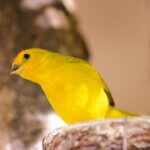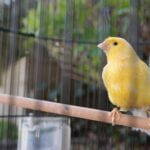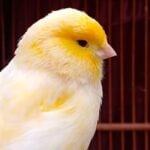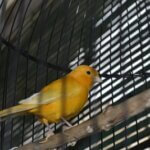Most owners are encouraged to cover their canaries’ cages at night. This can be with a specialized cover, bought from a pet store, or a blanket made from cotton and tightly woven. This convinces canaries that night has fallen and, thus, it’s time to sleep.
Placing a blanket over your canary’s cage is recommended. It’s not strictly necessary, but it does work to ensure better, more peaceful, and more consistent sleep.
Even though wild canaries don’t benefit from this custom-tuned environment, it’s important for domestic canaries because they’re exposed to disturbances in the home, especially if they live in an urban area.
Should Canaries Be Covered At Night?
To tell if your canary will need a cover, evaluate the following:
- The room it sleeps in
- Objects, pets, or people in the room
- Amount of light
- Noise levels
- Possibility of movement
For example, if the room is naturally dark throughout the night and isn’t near a noisy street, a covering isn’t necessary for your canary’s cage.
However, if there’s a lot of noise (whether from humans, pets, or vehicles), ambient light, or people and pets regularly moving through the home, the canary will need a blanket over its cage at night.
Adding a cover to the bird’s cage will prevent the following problems:
Scared Awake
As prey animals, canaries often sleep with one or both eyes open, leaving only one part of their brain asleep while the other half remains alert. This is known as Unihemispheric Slow-Wave Sleep (USWS).
Unfortunately, according to Nature and Sleep Science, the USWS adaptation means that birds are more sensitive to nighttime disturbances.
Even the slightest noise and movement can wake them up. Because canaries need upward of 10 hours of sleep per night, being jolted awake by disturbances can negatively affect their health.
Meanwhile, placing a blanket over their cage will dull sounds, light, and movements, so the canary doesn’t notice them. This allows it to sleep peacefully without being routinely upset by the outside world.
Night Frights
Canaries startled awake may experience night fright, which is bad for their mental and physical health. Night fright occurs when a sleeping canary is frightened by a disturbance and wakes up in a frenzy.
The canary may flutter haphazardly or slam against its cage walls as it attempts to fly to safety. Because canaries don’t have good night vision, they can’t see obstacles and run directly into them.
Likewise, they won’t be able to see and identify whatever threat awoke them, so they’re difficult to calm down and may harm themselves in their panic.
Covering a canary’s cage will reduce night fright incidences. So, it’ll be kept in quiet, secure darkness and not startled by a cat walking by, a car passing by outside, or shadows moving in a nearby window.
Light Exposure
Fear and disturbances aside, too much light can make it impossible for canaries to sleep.
Most of their hormones and routines are based on exposure to daylight, telling them what the season is and, thus, how to behave.
According to the Journal of Zoology, extended periods of light exposure are harmful to canaries, particularly females. Your canary may lose feathers and experience skin sensitivity.
Canaries are diurnal animals that often associate bright lights with daytime. Even if it’s mostly dark, less than complete darkness could make your canary naturally stay awake, as it believes it’s still daytime.
This can happen when your canary is exposed to street lights, indoor lights, moonlight, or ambient light from appliances. So, covering a canary will prevent it from seeing light waves.
How Do Wild Canaries Sleep Without Being Covered?
Since wild canaries don’t have human-tailored sleeping areas, you may assume they’re more adept at handling disturbances. However, wild canaries choose dark, secluded areas in trees or thick foliage.
These areas provide the darkness needed for uninterrupted sleep and block out moonlight. They also keep the canaries safe, as the canopy makes it far more difficult for predators to see or reach them.
Better yet, most nights won’t have moonlight illuminating the canary’s sleeping area, making them feel vulnerable or interrupting their rest.
Moreover, areas wild canaries live don’t have most of the distractions found in human settlements. Thus, canaries can sleep for hours without seeing any flashing lights or hearing loud noises.
Wild canaries aren’t locked in tight, enclosed spaces. For this reason, they can fly away and escape if they sense any danger. Even with poor night vision, finding another safe canopy will be easier, and the canary will settle down and return to sleep.
Wild canaries aren’t in danger of injuring themselves by crashing into cage bars or getting tangled in decorations. Their panic won’t escalate due to feeling trapped and vulnerable to predators.
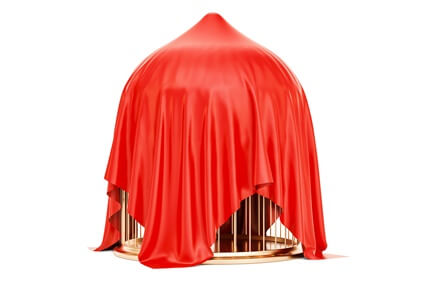
What Time Should I Cover My Canary?
Put your canary to sleep about 12 hours after it awakens because birds need 10-12 hours of sleep. For example, if your canary woke up at 7 in the morning, you should cover it by 7 pm.
Merely covering the canary’s cage should convince it that night has fallen and it’s time to sleep. You don’t need to worry if the sun’s duration in your region falls out of sync with this plan.
Even with a cover, your canary may be startled awake if its sleeping area isn’t calm.
Once it’s bedtime for your canary, converse in low tones, lower the volume of your TV and other electronics, and stop all movements in and around the canary’s sleeping area.
What Should I Cover My Canaries Cage With?
The best cage coverings for canaries are made from cotton, as they’re breathable and relatively opaque. The ideal material should allow easy air passage on all sides and be tightly woven.
The latter trait is especially important, as canaries nibble on everything they can reach. If the fabric you choose is loosely woven, your canary may ingest the cotton, blocking its digestive tract.
Covering Bird Cage During the Day
It’s unnecessary to cover your canary’s cage during the day unless it’s summer and the days in your region are longer than usual.
On regular days, it’s advisable to adhere to a schedule that canaries are adapted to. For example, light for 12 hours and complete darkness for the other 12 hours.
Because they’re diurnal, canaries need ample sunlight for Vitamin D production and calcium synthesis. Ideally, let your canary sunbathe for 30 minutes daily to gain enough Vitamin D.
If sunlight is scarce, you can use artificial lights made specifically for birds. This will give your canary the UV it needs while illuminating the space so it can perform its daytime routine.

